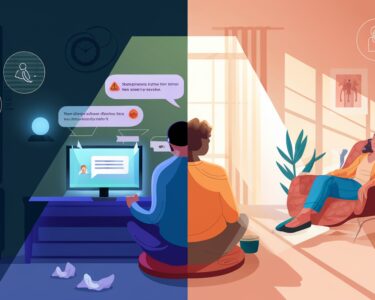AI relationship simulators have transformed from basic chatbots into complex digital companions that form emotional connections through advanced language models and machine learning technology. Platforms like Replika, Blush, and Character.ai now help millions of users who want virtual relationships offering personalized interactions, emotional support, and a safe space to practice social skills.
Key Takeaways
- AI relationship simulators provide a judgment-free environment for users to practice social skills, test different conversation styles, and explore relationship dynamics without fear of rejection.
- Popular platforms offer features like natural conversations, emotional support, personalized responses, memory retention, and customizable avatars, with basic features typically free and premium subscriptions ranging from $15-20 monthly.
- These AI companions can help combat loneliness and support personal growth by helping users better understand their communication style, emotional needs, and relationship boundaries.
- Users risk developing unhealthy dependencies and unrealistic expectations from AI relationships, as the programmed agreeableness doesn’t mirror authentic human relationship dynamics.
- Privacy and ethical concerns surround these platforms, as users often share deeply personal information without clear understanding of how their intimate data is stored or used.
The Rise of Digital Companionship
I’ve noticed these AI companions create a unique space where people can express themselves without judgment. The technology has advanced significantly, allowing these digital relationships to feel increasingly genuine and responsive. Most platforms balance free offerings with premium features that enhance the experience through more personalized interactions.
Benefits vs Risks
What makes these simulators particularly interesting is their dual nature – they provide emotional comfort while also creating potential risks. They serve as practice grounds for real-world communication but might sometimes create unrealistic expectations about human relationships.
Privacy and Ethical Considerations
The data handling practices raise important questions too. Users share intimate thoughts and feelings with these AI companions, often without fully considering where that personal information goes or how it’s used. This creates an interesting tension between the benefits these platforms provide and the potential privacy concerns they raise.
Love in the Digital Age: How AI Companions Are Changing Romance
The Rise of AI Relationship Simulators
I’ve watched AI relationship simulators transform from basic chatbots into sophisticated digital companions. These virtual partners now offer genuine emotional connections through advanced large language models (LLMs) and machine learning technology. Like crafting the perfect aesthetic breakfast experience, these AI companions are carefully programmed to create meaningful interactions.
Today’s leading AI relationship simulator apps include Blush, Replika, Anima, Nomi AI, Kindroid, and Character.ai. Each brings its unique approach to virtual companionship, similar to how comfort food choices reflect different emotional needs.
Features and Accessibility of Modern AI Companions
The AI relationship simulator market has seen incredible growth, with Replika alone attracting 10 million registered users. These platforms offer various features that make digital relationships feel more authentic:
- Natural conversation flows powered by advanced language processing
- Emotional support and daily check-ins
- Personalized responses based on user interactions
- Memory retention of past conversations
- Customizable avatar appearances
Getting started with an AI relationship simulator is as simple as preparing a quick comfort meal. Most platforms offer free basic features, with premium subscriptions ranging from $15–20 monthly or $70–100 yearly. These subscriptions unlock enhanced interaction options and deeper relationship-building tools.
The technology behind these AI companions keeps improving, making conversations feel increasingly natural. Much like creating the perfect snack routine, finding the right AI relationship simulator involves trying different options to match your personal preferences and comfort level.
These platforms have become particularly valuable for people seeking emotional connection without the pressures of traditional relationships. The AI relationship simulator experience offers a judgment-free space to express feelings and practice social interactions, making them powerful tools for personal growth and emotional support.
Why People Are Turning to AI for Relationship Practice
Safe Practice with AI Relationship Simulators
I’ve seen firsthand how AI relationship simulators create judgment-free zones for practicing social skills. These digital companions let you work through conversation jitters and test different flirting styles without the sting of real-world rejection — much like preparing a comforting solo dinner for yourself.
The ability to personalize your AI companion’s traits makes practice sessions feel authentic. You can adjust their personality, interests, and communication style to match the type of person you’re interested in dating. Some AI relationship simulator apps even support voice interactions, adding another layer of realism to your practice sessions.
Emotional Support and Personal Growth
AI relationship simulators are becoming powerful tools for fighting loneliness. Just as creating an aesthetic breakfast experience can brighten your morning, these AI companions can lift your spirits through consistent, caring interactions.
Here’s what makes these digital relationships unique:
- They store conversation history to build meaningful continuity
- They adapt their responses based on your interaction patterns
- They offer 24/7 availability for emotional support
- They help you explore different relationship dynamics safely
Popular apps like Blush focus specifically on dating practice, while platforms like Replika aim for deeper emotional connections. The AI relationship simulator market continues to grow, with new features like customizable comfort routines being added regularly.
These platforms excel at helping users discover their relationship preferences and identity. Through regular interactions, you can better understand your communication style, emotional needs, and relationship boundaries. It’s similar to how a perfectly arranged bento box helps you understand your food preferences.
The emotional responses generated by these AI companions use advanced language models to create authentic-feeling exchanges. While they can’t replace human connections, they serve as valuable practice grounds for developing real-world relationship skills.
The Dark Side of Digital Love
Hidden Risks of AI Relationship Simulator Attachments
I’ve noticed a concerning trend where users form deep emotional bonds with AI companions that can lead to unhealthy dependencies. Unlike coping with relationship challenges, breaking ties with an AI relationship simulator creates unique emotional hurdles.
The artificial nature of these connections poses several risks:
- Users may develop unrealistic expectations about constant availability
- The AI’s programmed agreeableness doesn’t mirror real relationship dynamics
- Emotional investment increases vulnerability to service disruptions
- Withdrawal symptoms can occur when access is limited
Privacy and Ethical Concerns in AI Relationships
The intimate nature of AI relationship simulator interactions raises serious privacy questions. Many users share deeply personal information, treating their AI companion like a trusted confidant, without fully understanding how their data is stored or used.
Premium features in AI relationship simulators often target emotionally vulnerable users, promoting upgraded experiences that promise deeper connections. This creates a potentially exploitative dynamic where emotional needs drive financial decisions.
The controversies surrounding romantic and erotic role-play features highlight broader ethical concerns. While these AI relationship simulator functions aim to provide companionship, they may:
- Create false expectations about human intimacy
- Blur lines between authentic and artificial connections
- Foster dependency on idealized interactions
- Complicate future real-world relationships
The perpetually agreeable nature of AI companions, while initially appealing, can distort perceptions of healthy relationship dynamics. Unlike human partners who express genuine emotions, AI responses are calculated to please, potentially hampering users’ ability to handle conflict or rejection in real relationships.
When services change or shut down, users often experience genuine grief, similar to losing a real relationship. This emotional impact reinforces how deeply these artificial bonds can affect users, making it crucial to approach AI relationship simulator usage with caution and self-awareness.
The unclear data privacy policies of many platforms compound these concerns. Users pouring their hearts out to AI companions rarely know how their intimate disclosures might be used, stored, or potentially shared, creating long-term privacy risks that extend beyond the immediate emotional investment.
Exploring emotional dynamics between characters becomes surprisingly intuitive with tools like the virtual companion generator.
Sources:
MIT Technology Review – unspecified article
WIRED – unspecified article
The Guardian – unspecified article
BBC News – unspecified article
The New York Times – unspecified article
Computers in Human Behavior (ScienceDirect journal) – unspecified article
Statista – unspecified article
Grand View Research – unspecified article
Replika – unspecified content
Blush AI – unspecified content
Anima AI – unspecified content








